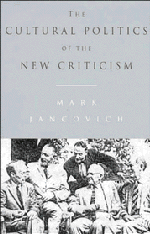Book contents
- Frontmatter
- Contents
- Preface
- List of abbreviations
- Part I The New Criticism and its critics
- Part II The formation of the New Criticism
- Part III The establishment of the New Criticism
- Introduction
- 7 The origins of academic involvement
- 8 Understanding literature: textbooks and the distribution of the New Criticism
- 9 The form of criticism
- Part IV The development of the New Criticism
- Conclusion: Modernism and postmodernism within the American academy
- Conclusion
- Notes
- Bibliography
- Index
- Frontmatter
- Contents
- Preface
- List of abbreviations
- Part I The New Criticism and its critics
- Part II The formation of the New Criticism
- Part III The establishment of the New Criticism
- Introduction
- 7 The origins of academic involvement
- 8 Understanding literature: textbooks and the distribution of the New Criticism
- 9 The form of criticism
- Part IV The development of the New Criticism
- Conclusion: Modernism and postmodernism within the American academy
- Conclusion
- Notes
- Bibliography
- Index
Summary
In the mid-1930s, Ransom, Tate and Warren went through two major transitions. First, they moved away from Agrarianism and became involved in the struggles over the teaching of English in the academy; and second, they broke their attachment to the South as a geographical region. Ransom and Tate in particular physically moved out of the South and took up posts at academic institutions elsewhere. Despite their former attachment to the region, it had failed to satisfy their professional desires. Other regions offered greater rewards both in terms of financial benefits and intellectual resources. This problem was hotly debated in 1937 when Ransom was made an offer by Kenyon College which Vanderbilt University refused to match. For Tate in particular, this incident indicated that unlike other regions the South was not willing to provide support for a profession of intellectuals. Tate himself was having financial problems throughout this period. He could not support himself financially as a poet in the South. Consequently, he was not only forced to rely on short periods of teaching at various universities and colleges, but also on Northern publishing houses for the publication of his poetry. The two transitions were therefore connected. Vanderbilt's refusal to match the Kenyon offer only focused a general sense of dissatisfaction with their defence of the South. They became aware that while they were prepared to support the South, the South seemed unwilling to support them.
The period was not one of despondency though. The Kenyon offer showed that other opportunities were opening up.
- Type
- Chapter
- Information
- The Cultural Politics of the New Criticism , pp. 67 - 70Publisher: Cambridge University PressPrint publication year: 1993



